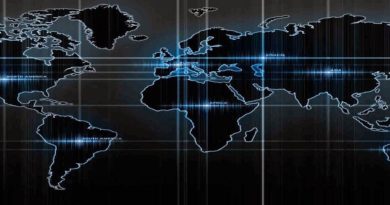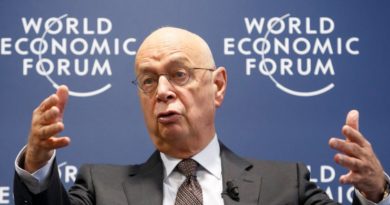The ‘Freedom Convoy’ is ending, but issues ‘not going away’
For three weeks, Canadian truckers and their supporters have occupied downtown Ottawa.
Organised by far-right activists, the so-called “Freedom Convoy” has dominated international news headlines as participants called for an end to all coronavirus restrictions in Canada and for Prime Minister Justin Trudeau to be removed from office, among other things.
On February 14, Trudeau invoked a never-before-used emergency measure to give his government sweeping powers to disperse the demonstrators, and police on Friday began arresting participants in the blockade that has paralysed downtown Ottawa.
While the protest – which Ottawa residents called an “occupation” and officials at all levels of government described as unlawful – is coming to an end, the issues that fuelled it are not likely to go away.
Carmen Celestini, a post-doctoral fellow with The Disinformation Project at Simon Fraser University, says the convoy is the culmination of the growth during the COVID-19 pandemic of online communities rife with conspiracy theories, misinformation and disinformation. “Simultaneously, we had right-wing extremist groups … making a concerted recruitment effort to spread ideologies within these social communities being created online,” she said.
Here, Al Jazeera speaks to Celestini about the factors that led to the convoy blockades and protests, what ideas have circulated among participants, and where Canada goes from here.
Al Jazeera: Who has been participating in these protests?
Carmen Celestini: We can see that there are people who genuinely are there to protest their concerns about mandates and how it affects their families and their finances and way of life. But we also see a large component of conspiracy theorists, both about COVID and QAnon and the Great Reset, and we see right-wing extremists, as well.
Al Jazeera: We have seen people rallying around the word “freedom” – why is that?
Celestini: It’s really important when we think about social movements that the language that is being used is something that can really motivate people. [Freedom] is something that people hold dear – and it can be something that you want to fight for. It’s a common language.
We can see that too with slogans that they’re using, like Make Canada Great Again. We see these terms that sort of have filtered out from the south [the United States] up here to Canada.
Even some of the leaders, with the way that they were articulating what their end goal was, it wasn’t simply the end of the [coronavirus] mandates, but also for them to have a role in our government and to have control over the democracy.
While there was a movement with people who were protesting for genuine concerns, people who were there because they see themselves as heroes, saving Canada from these conspiracy theories. We also see nefarious characters acting out with extremism and with almost a dismantling of our democratic process.
Al Jazeera: Far-right and other extremist activists were among the key convoy organisers, who over the past few weeks have been able to raise millions of dollars for their cause. How have they been able to get that level of support?
Celestini: The way that populism, or the spreading of right-wing extremism ideology, or ideology as a whole works, is based on fear.
If we look at what was happening during the pandemic, people were afraid of losing their jobs, or not having money to pay rent, not being able to care for their families or feed their families or house their families. It seemed never-ending that this perpetuation of disaster or fear was there, and so you try to find some type of resolution for that fear. Some people may turn to their religion, but when prayers don’t work … you try to find what is human-made that is making this happen.
For conspiracy theories to take effect, there also has to be distrust in institutions. So we see this sowing, which has been happening for a while, of distrust of legacy media, distrust of the government, distrust of most institutions. And so there’s also an aspect of disenfranchisement.
Al Jazeera: Prime Minister Justin Trudeau really seems to be the main target of a lot of the vitriol we have seen over the past weeks. Can you explain how he has been so vilified?
Celestini: These conspiracy theories are inter-linked together and it’s hierarchical, creating what we call a super conspiracy theory – so the Great Reset and other conspiracy theories like QAnon interact with each other, and provide different formats for discussion, for solutions.
Politically it’s not a group of people who are angry at the political system or angry with a specific party; they’re angry at an individual. Everything is directed towards Prime Minister Justin Trudeau, and he is so interlinked to these hierarchical conspiracy theories that he really has become the problem.
We see a rhetoric of more anger. The people who are participating as [political] candidates spreading conspiracy theories, spreading name-calling, things that were not common within the politics of Canada, and we see new players trying to engage through these conspiracy theories to create their own government movement. This is somewhat new.
Al Jazeera: Who or what party are you referring to?
Celestini: The People’s Party of Canada. There were candidates there whose entire platform was against mandates and against vaccines … and we see them engaging and popularising what is happening during the convoy. They built this populist movement and now they are supporting this [convoy] and encouraging them.
This isn’t going to go away once the protests have been dismantled. That will be something that is continuously built upon until the next election, which can grow populism and nationalism in Canada, much more so than it has been already.
 Police hand out leaflets warning truck drivers to leave downtown Ottawa [File: Blair Gable/Reuters]
Police hand out leaflets warning truck drivers to leave downtown Ottawa [File: Blair Gable/Reuters]Al Jazeera: Trudeau’s comment that the protesters make up a “fringe minority” seems to have galvanised people, who have worn the phrase as a badge of honour. How difficult is it to break through that, as participants in this convoy appeared to have hardened their views?
Celestini: I think that so many people have been, for lack of a better term, down this rabbit hole, on the conspiracy theories – and I think that as a society we haven’t really dealt with the ideas of misinformation, disinformation and conspiracy theory.
These are things that previously we have dismissed. If you think about conspiracy theory, you think of somebody who is on the margins of society and then have stereotypical ideas of them wearing a tin-foil hat or not really understanding politics and not understanding reality. Then people who engage in misinformation or disinformation, we also approach with mockery or dismissal. But I think it behooves us to engage in this, understand it, and learn how to interact with it to stop it.
At this point, even if all of the mandates end … that distrust and sense of disenfranchisement is not going to go away. As a whole, we didn’t take it seriously enough and we didn’t engage with it and try to counter it, and so now we’re really feeling the impacts of this.
This is articulated truly as a battle for Canada, for the world, against this new world order and the figures like the prime minister who are attached to this.
This interview has been edited for length and clarity.


